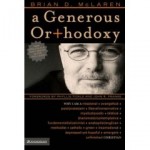 I am currently reading A Generous Orthodoxy, and thoroughly enjoying it. It is one of those books I almost wish I'd found years ago, one of those books that is somehow a 'friend' where you keep finding yourself nodding quietly and smiling as you think 'you too.' I don't agree with absolutely everything I've read in it, but it has such wonderful resonances that I am thankful to have discovered it. Whilst Mclaren's list of what he is becomes complex, I am happy either to say 'I don't do labels' or to be known as a 'happy heretic' or 'whacky Bappy', either of which is a little more snappy. I guess I am even a bit of a theological chameleon, in imitation of the apostle Paul (all things to all people).
I am currently reading A Generous Orthodoxy, and thoroughly enjoying it. It is one of those books I almost wish I'd found years ago, one of those books that is somehow a 'friend' where you keep finding yourself nodding quietly and smiling as you think 'you too.' I don't agree with absolutely everything I've read in it, but it has such wonderful resonances that I am thankful to have discovered it. Whilst Mclaren's list of what he is becomes complex, I am happy either to say 'I don't do labels' or to be known as a 'happy heretic' or 'whacky Bappy', either of which is a little more snappy. I guess I am even a bit of a theological chameleon, in imitation of the apostle Paul (all things to all people).
At first I thought, I wish I'd found this book years ago, it might have saved the heartache and struggle of trying to be what various denominations/persuasions expected me to be. But actually, when I think a little harder, it is precisely the wrestling, struggling, praying, failing, succeeding, wondering, doubting, encountering... (I'm starting to sound like him now!) that has brought me to where I am and who I am. I don't regret any part of the 'journey' and have gained so much from the various experiences I have known.
I do think that the book ought to be mandatory reading for anyone entering ministerial formation in any denomination, partly because it is a gentle introduction to having your boundaries stretched, but also because for all his almost total absence of references, Mclaren has actually read a lot of important authors. Anyone who cites Bosch, Brother Lawrence and Grenz (to name but three; haven't found any Barth or Moltmann yet but I'm waiting hopefully...) must be alright in my view. It's also a book I feel I could with integrity to give to my non- or anti-Christian friends as it is neither patronising or prescriptive.
I have just read his little chapter on the role of the Bible and found stuff that sort of relates to my thinking about use of historical resources. Made me smile, this is so often the way I experience God at work. My categorising brain gathers and sorts various bit and pieces to make nice neat stacks of information that might come in useful... and I mutter that all my best ideas have been thought of by someone else first.